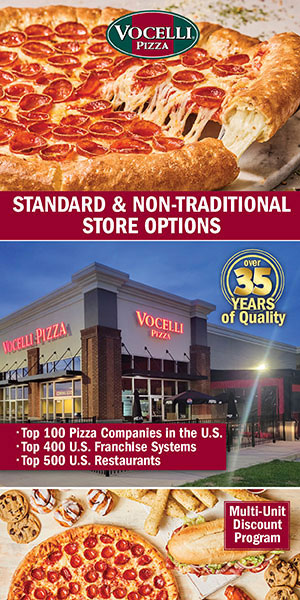Navigating Economic Challenges in 2024: Strategies for Franchise Operators

Franchise operators are staring down significant economic challenges in the coming year, including rising labor costs, interest rates, and insurance costs. Additionally, new rulings from the National Labor Relations Board (NLRB) are likely to add to the complexity of operating a business.
Savvy multi-unit franchisees must adapt and strategize accordingly. A key focus should be on enhancing operational efficiency and integrating technological advancements to streamline processes. Franchisees who are proactive and innovative will be ahead of the pack when it comes to ensuring continued growth and success in 2024.
For the third edition of our series, we asked two more members of the Multi-Unit Franchising Conference's Board of Directors how they plan to approach business in 2024. David Ostrowe is president and CEO of O&M Restaurant Group and operates 14 Burger Kings, 6 Blaze Pizzas, and 18 Taco Bells. Gary Robins owns and operates 65 Supercuts throughout Pennsylvania, New Jersey, Maryland, and Delaware.
Here's what they had to say about planning for the coming year.
What is your vision for the economy, the franchise marketplace, and your own business in 2024?
Ostrowe: As we look ahead to 2024, I anticipate several economic challenges that will significantly impact our business and the broader franchise marketplace. We can expect a continual increase in labor costs, interest rates, commodity prices, utilities, and insurance. Additionally, heightened regulations from the NLRB will likely add to our challenges.
In response, it's crucial for us to adapt and strategize accordingly. Our focus should be on enhancing operational efficiency and integrating technological advancements to streamline our processes. This approach is essential across all our brands with each requiring a tailored strategy to navigate these economic shifts effectively.
The coming year will demand resilience, adaptability, and strategic foresight from us. We must be proactive and innovative in our approach to ensure continued growth and success in a challenging economic landscape.
Robins: Uncertain. There are many factors to consider. Many favor continued growth and others point to a significant downturn.
Looking at all the factors, my thinking is that there will be a downturn in consumer spending, but for our business—health and beauty—the downturn will be less significant than other areas.
In what ways do you think this will impact multi-unit franchisees and their business operations in the coming year?
Ostrowe: I would break it down this way:
- Operational costs: The rise in labor, commodities, utilities, and insurance will significantly increase operational costs. This means tighter margins, necessitating a sharper focus on cost management and operational efficiency.
- Staffing challenges: With higher labor costs, attracting and retaining quality staff might become more challenging. You'll need to balance wage increases with productivity improvements.
- Capital expenditure and expansion plans: Rising interest rates will make financing more expensive. This could slow down expansion plans or refurbishments, requiring more strategic capital allocation.
- Menu and service adaptation: Cost fluctuations may necessitate menu adjustments, perhaps focusing more on cost-effective but popular items to maintain profit margins.
- Technology and automation: To counterbalance rising operational costs, investing in technology and automation for order taking, kitchen operations, and even marketing can drive efficiencies and reduce labor dependence.
- Regulatory compliance: Increased regulations, especially from bodies like the NLRB, mean you'll have to be vigilant about compliance, which might require additional resources.
- Marketing and customer loyalty: In tighter economic times, maintaining customer loyalty becomes crucial. Effective marketing and community involvement can help in retaining your customer base.
- Supply chain management: With commodity price hikes, managing supply chains efficiently to avoid disruptions and extra costs will be critical.
- Diverse revenue streams: Diversifying revenue streams, such as incorporating delivery services or exploring new market segments, could help mitigate risks associated with economic downturns.
- Local market sensitivity: If you operate across multiple states, staying attuned to local economic conditions and adapting your strategy accordingly will be important.
Robins: I think you will see reduced spending on technology, marketing, and capital expenditures.
How can multi-unit franchisees prepare their businesses for 2024?
Ostrowe: Be nimble and learn to say "no." Wear your seatbelt and get ready for a pullback across the board.
Robins: Most importantly, you need a growth plan to navigate the uncertainty or downturn.
Share this Feature
Recommended Reading:
| ADVERTISE | SPONSORED CONTENT |
FRANCHISE TOPICS
- Multi-Unit Franchising
- Get Started in Franchising
- Franchise Growth
- Franchise Operations
- Open New Units
- Franchise Leadership
- Franchise Marketing
- Technology
- Franchise Law
- Franchise Awards
- Franchise Rankings
- Franchise Trends
- Franchise Development
- Featured Franchise Stories
| ADVERTISE | SPONSORED CONTENT |

$50,000
$50,000





 The multi-unit franchise opportunities listed above are not related to or endorsed by Multi-Unit Franchisee or Franchise Update Media Group. We are not engaged in, supporting, or endorsing any specific franchise, business opportunity, company or individual. No statement in this site is to be construed as a recommendation. We encourage prospective franchise buyers to perform extensive due diligence when considering a franchise opportunity.
The multi-unit franchise opportunities listed above are not related to or endorsed by Multi-Unit Franchisee or Franchise Update Media Group. We are not engaged in, supporting, or endorsing any specific franchise, business opportunity, company or individual. No statement in this site is to be construed as a recommendation. We encourage prospective franchise buyers to perform extensive due diligence when considering a franchise opportunity.